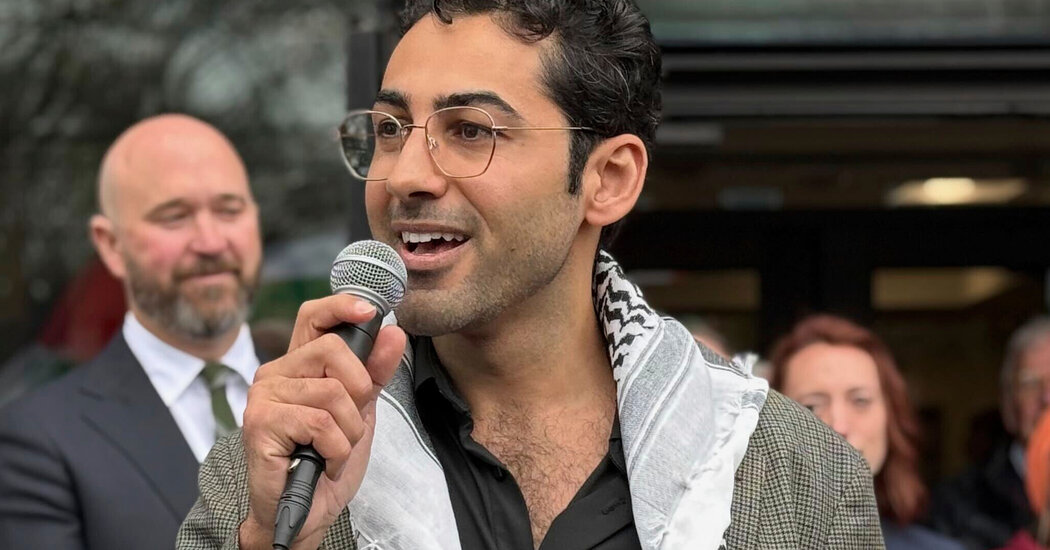Mohsen Mahdawi, an organizer of the pro-Palestinian movement at Columbia University, was freed from federal custody on Wednesday, more than two weeks after immigration officials detained him and sought to rescind his green card as part of a widening crackdown against student protesters.
In releasing Mr. Mahdawi on bail, Judge Geoffrey W. Crawford of Federal District Court in Vermont drew parallels between the current political climate and McCarthyism.
“This is not the first time that the nation has seen chilling action by the government intended to shut down debate,” Judge Crawford said.
The release of Mr. Mahdawi, a permanent legal resident, is a defeat for the Trump administration, though it does not mean the end of the federal government’s action against him. His immigration case will continue, but he will be able to fight it from outside a detention facility.
Mr. Mahdawi struck a defiant tone after his release.
“I am saying it clear and loud, to President Trump and his cabinet: I am not afraid of you,” he said.
The secretary of state, Marco Rubio, has argued that protesters like Mr. Mahdawi have spread antisemitism, while demonstrators say criticism of Israel’s actions in Gaza is not antisemitic.
Tricia McLaughlin, a spokeswoman for the Department of Homeland Security, denounced Judge Crawford’s decision in a post on social media.
“When you advocate for violence, glorify and support terrorists that relish the killing of Americans and harass Jews, that privilege should be revoked and you should not be in this country,” Ms. McLaughlin said, without offering any evidence to support her accusations.
Mr. Mahdawi, 34, had been in custody since April 14, when immigration officials detained him at an appointment in Vermont, where he is a resident, that he thought was a step toward becoming a U.S. citizen.
In granting the release of Mr. Mahdawi, Judge Crawford cited his extensive ties to his community and said he did not pose a danger to the public. He noted that the court had received more than 90 submissions from community members, academic experts and professors who know Mr. Mahdawi, “many of them Jewish,” attesting to his character and consistently describing him as “peaceful.”
The judge also spoke of the “extraordinary circumstances” of Mr. Mahdawi’s detention and the present moment in history.
Michael Drescher, the acting U.S. attorney in Vermont, who argued on behalf of the Trump administration, said that immigration officials had solid legal reason to detain Mr. Mahdawi as they considered his deportation case.
Mr. Drescher noted that Mr. Mahdawi is not a U.S. citizen and has access to resources that would enable him to leave the country. “His detention is not illegal,” Mr. Drescher said.
Judge Crawford’s Burlington courtroom was packed on Wednesday with supporters of Mr. Mahdawi, who remained hushed as the judge issued his order. A few began clapping as Mr. Mahdawi was allowed to collect his belongings and leave immediately.
Dressed in a plaid suit and wearing gold wire-rimmed glasses, Mr. Mahdawi draped a kaffiyeh around his shoulders. As he walked out of the courthouse to a jubilant reception, he raised his hands in the peace sign.
“They arrested me. What’s the reason? Because I raised my voice, and I said no to war, yes to peace,” Mr. Mahdawi said. “Because I said, ‘Enough is enough. Killing more than 50,000 Palestinians is more than enough.’”
A green card holder for the past 10 years, Mr. Mahdawi was not accused of a crime. Rather, Mr. Rubio wrote in a memo justifying his arrest that his activism “could undermine the Middle East peace process by reinforcing antisemitic sentiment.”
Mr. Rubio has said that immigration authorities have the right to eject even legal residents from the country for protest activities that the government says harm America’s foreign policy interests.
Mr. Mahdawi’s lawyers had requested a temporary restraining order to prevent federal officials from transferring him to a more conservative jurisdiction.
That tactic was used in the detention and attempted deportation of at least four other college demonstrators, including Mahmoud Khalil, a legal permanent resident and Columbia graduate who has been in a Louisiana detention facility since last month.
Another federal judge in Vermont, William K. Sessions III, swiftly granted that request, ordering that Mr. Mahdawi, who grew up in a Palestinian refugee camp in the West Bank, not be removed from the United States or transferred out of Vermont until he ordered otherwise.
Judge Crawford then extended the decision to keep Mr. Mahdawi in the state until Wednesday’s ruling.
Shortly after Mr. Mahdawi’s release, his lawyers said that he would be allowed to finish his academic program at Columbia.
“Today’s victory cannot be overstated. It is a victory for Mohsen who gets to walk free today out of this court,” said one of the lawyers, Shezza Abboushi Dallal.
“And it is also a victory for everyone else in this country invested in the very ability to dissent, who want to be able to speak out for the causes that they feel a moral imperative to lend their voices to and want to do that without fear that they will be abducted by masked men.”
Even though Mr. Mahdawi is still at risk of deportation, his release from detention will give him a much stronger chance to challenge the government’s allegations, said Joshua Bardavid, an immigration lawyer in New York.
“It is so much more difficult to fight a case from detention, first and foremost, because the government gets to choose the venue,” Mr. Bardavid said. “Generally speaking, a case is heard where you are detained, and certain courts are known for being much more government-friendly than other locations.”
Because Mr. Mahdawi was released in Vermont, his case is likely to be heard in the Northeast, Mr. Bardavid said.
The Trump administration had sought to deport Mr. Mahdawi using the same legal provision that it used to detain Mr. Khalil in Manhattan before transferring him to Louisiana.
The government has contended that his presence is a threat to the foreign policy and national security interests of the United States. Federal officials have argued that pro-Palestinian demonstrators have enabled the spread of antisemitism, but they have not provided evidence of that.
Anna Kelly, a White House spokeswoman, said the administration regards studying in the United States as “a great privilege, not a right,” and that any noncitizen who harms national security or commits a crime “should be promptly deported.”
In April, an immigration judge in Louisiana found that federal officials could deport Mr. Khalil, and the Department of Homeland Security later denied him permission to attend the birth of his first child, who was delivered at a New York hospital.
In recent weeks, Mr. Mahdawi had been in hiding, worried about being arrested by immigration police after Mr. Khalil was detained at campus housing at Columbia. He asked the university for help but did not receive it. An extreme pro-Israel group, Betar, had warned on social media that he was next to be detained.
But he was determined to appear for an interview he had been told was related to his naturalization, even though he feared it was a trap. He alerted Vermont’s senators and representative in case things went wrong, and before the appointment, he studied the Constitution, preparing for a naturalization test.
Instead, immigration officers, some with their faces covered, placed Mr. Mahdawi in handcuffs and arrested him, according to a statement released by Vermont’s congressional delegation, Senators Peter Welch and Representative Becca Balint, both Democrats, and Senator Bernie Sanders, an independent.
On Wednesday, the lawmakers expressed relief that Mr. Mahdawi had been freed from detention and said that his constitutional right to due process had prevailed. They said that he had done nothing wrong and had been unfairly targeted by the federal government.
“The Trump administration’s actions in this case — and in so many other cases of wrongfully detained, deported, and disappeared people — are shameful and immoral,” they said in a statement. On Columbia’s campus, the news of Mr. Mahdawi’s release from federal custody was hailed as an important first step.
Gabriella Ramirez, a second-year graduate student and member of the University Senate who knows Mr. Mahdawi, said she was “very encouraged to see the justice system at work with Mohsen’s release from unlawful detention.”
She added: “I remain hopeful that we will see a similar outcome for my classmate Mahmoud Khalil.”
Anvee Bhutani and Carolyn Shapiro contributed reporting.









